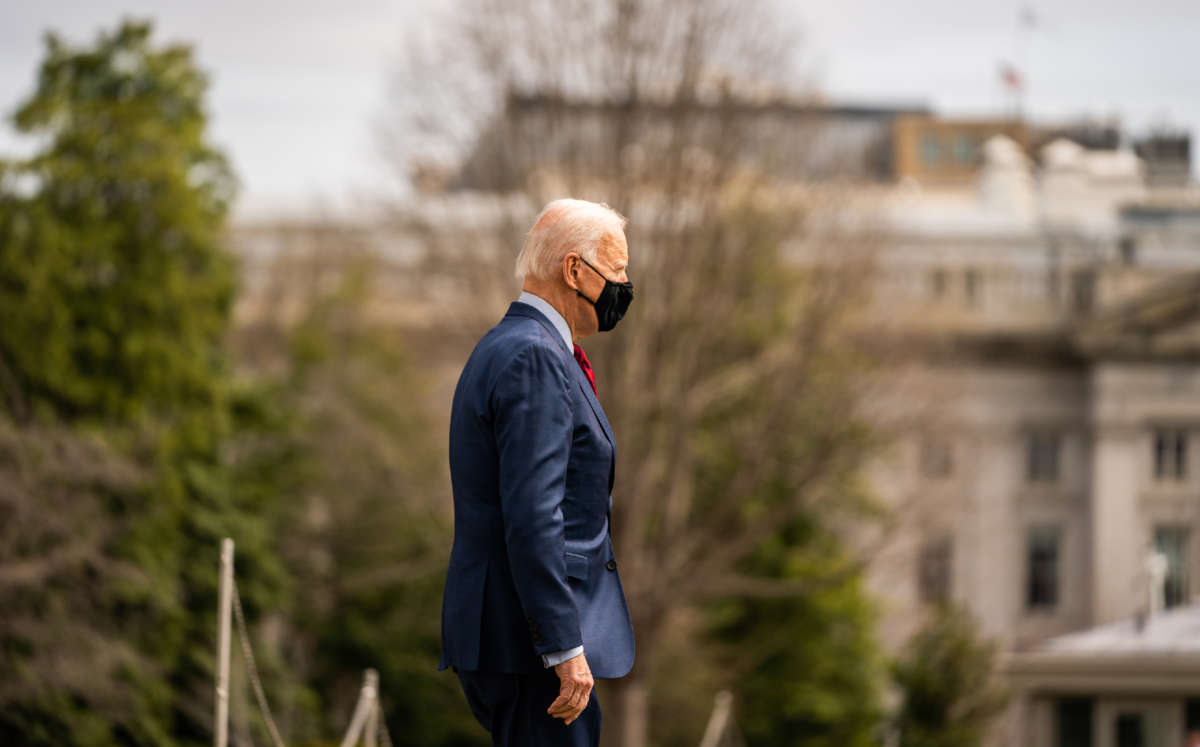Honest, paywall-free news is rare. Please support our boldly independent journalism with a donation of any size.
After pressure from progressives and some centrists, the White House is considering expanding the infrastructure bill, increasing spending to $4 trillion and raising tax increases to $3.5 trillion, The Washington Post reports. The initial version of the White House’s bill contained $3 trillion in spending and $1 trillion in tax hikes to help pay for it.
Senate Majority Leader Chuck Schumer (D-New York) reportedly helped orchestrate the proposed increases in spending and tax hikes. The expansion of the tax increases was made to appease moderates who were concerned about government spending.
It was previously reported that the tax hikes would include raising the corporate tax from 21 to 28 percent, as well as increasing taxes on wealthy individuals and shareholders. Under the initial proposal, the highest income tax rate would rise from 37 to 39.6 percent. It would also limit deductions that the wealthy can claim.
It’s unclear whether the new tax hike proposals make these increases larger or if they add new categories of expansion, but the administration believes the hikes can help lessen income inequality, those familiar with the plan told The Washington Post. White House Press Secretary Jen Psaki said on Monday that tax hikes and other revenue raisers are designed to pay for the entire infrastructure bill.
Uncompromised, uncompromising news
Get reliable, independent news and commentary delivered to your inbox every day.
Centrist Democrats are split on their support for the infrastructure bill and the tax hikes. Senators Angus King (I-Maine) and Jeanne Shaheen (D-New Hampshire) told The Hill that they want the infrastructure bill to have spending offsets, which the tax hikes could achieve. Sen. Joe Manchin (D-West Virginia) has proposed that the corporate tax be raised from 21 to 25 percent, less than the increase in the White House proposal.
Other Democrats, however, are energized by the prospect of using the infrastructure bill to begin addressing the climate crisis and want to avoid a potentially controversial tax hike that might prevent passage. “My bigger issue is that we get an infrastructure and climate bill. If tax reform is part of how we get there, I’m all for that. If it’s a distraction, then I’m not,” Sen. Martin Heinrich (D-New Mexico) told The Hill. Considering Republicans’ staunchly unified opposition to the widely popular American Rescue Plan, however, it’s unlikely that any concessions, big or small, would get them on board.
Senator Schumer said he’s talking to centrists in his caucus to maximize his options in order to ensure the package’s eventual passage, which he hopes can be achieved through budget reconciliation like the stimulus package. Normally, budget reconciliation can only be used once per year, but since Congress didn’t pass a budget resolution this year, Democrats can use it a second — or maybe even a third — time to try to pass President Joe Biden’s infrastructure bill.
Republicans are likely to try to cut down spending in the infrastructure bill and oppose the tax hikes on the wealthy and corporations, since these provisions would undo some of former President Donald Trump’s tax cuts.
Progressives, on the other hand, have advocated for a larger infrastructure bill and higher and more ambitious taxes on the wealthy. Sen. Bernie Sanders (I-Vermont) recently proposed raising the corporate tax rate to 35 percent — what it was before Republicans and Trump cut it dramatically in 2017. Sanders also proposed a dramatic progressive increase to the estate tax, as well as lowering the threshold for exemptions.
Sen. Elizabeth Warren (D-Massachusetts) has also introduced a tax bill which would create a 2 percent tax on wealth over $50 million and a 3 percent tax on wealth over $1 billion. Though Sanders’s and Warren’s proposals likely wouldn’t pass on their own, due to the Senate filibuster, they could have a chance at passing if they were folded into the budget reconciliation vote for the infrastructure bill.
In tandem with calls for higher tax rates on the wealthy, progressives have proposed more ambitious spending on infrastructure. The recent increase in the bill might satisfy that need for 16 environmental and labor groups who wrote a letter calling for Biden, Schumer and House Speaker Nancy Pelosi to increase the bill to at least $4 trillion, which Manchin has said he’d be okay with. The groups say that a larger bill would better suit the challenges the country is facing with the COVID-impacted economy and climate crisis.
Some lawmakers have called for even bigger spending. Lawmakers in the Congressional Progressive Caucus on Monday unveiled a $10 trillion infrastructure, climate and racial justice bill called the THRIVE Act, which would invest $1 trillion a year over the next decade. The THRIVE Act and corresponding agenda, proponents say, are a vital down payment on the Green New Deal. If it gains traction, it could be a progressive counterpart to Biden’s bill.
Press freedom is under attack
As Trump cracks down on political speech, independent media is increasingly necessary.
Truthout produces reporting you won’t see in the mainstream: journalism from the frontlines of global conflict, interviews with grassroots movement leaders, high-quality legal analysis and more.
Our work is possible thanks to reader support. Help Truthout catalyze change and social justice — make a tax-deductible monthly or one-time donation today.
